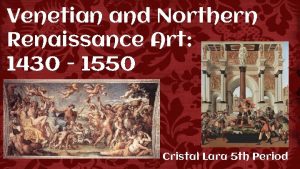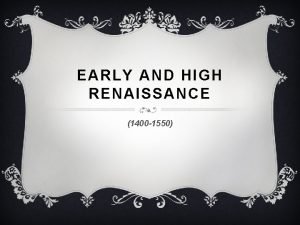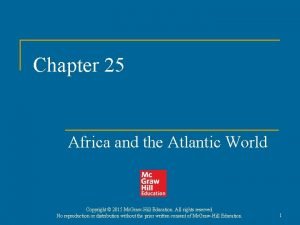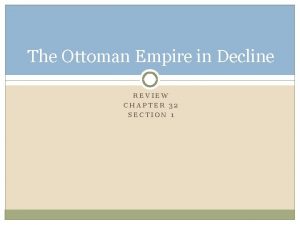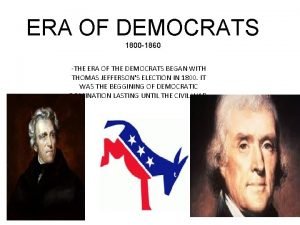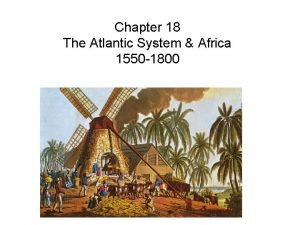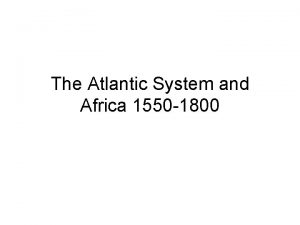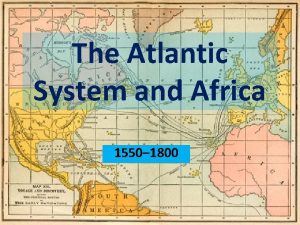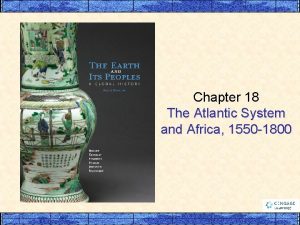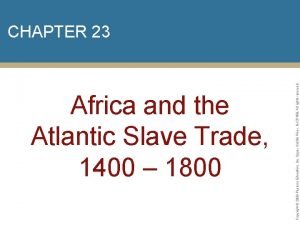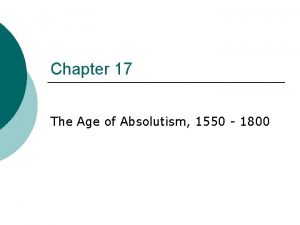The Atlantic System Africa 1550 1800 The Atlantic












- Slides: 12

The Atlantic System & Africa 1550 -1800 The Atlantic System: moved goods and wealth, as well as people and cultures, around the Atlantic. Africa: impact varied by region, where several major kingdoms dominated the continent

� After 1650 sugar plantations, African slaves, and European capital made these islands a major center of the Atlantic economy � Before 1650 English colonies prospered first because of greater support from home gov’t, grew tobacco � Competition with VA tobacco made the switch to sugar easy when the Dutch introduced it to Brazil � The Dutch West India Company monopolized the sugar trade and became essential to the slave trade � By the 1680 s sugar was the major crop from the New World and the slave trade grew as a result � Why Africans? Not better suited, not just prejudice, but mostly economical. Plantations in the West Indies

� Sugar production required only simple tools, but was a factory as well as a farm; took lots of land (Jamaica) � Environmentally responsible except when overusing land, deforestation, upset of food chain � Most islands were 90% slave, ruled by a small plantocracy (a few rich men) � Profitability of plantations depended on how much work was extracted from slaves � Slave men outnumbered women � Overwork and poor nutrition led to infertility and low life expectancy (23 for males, 25. 5. for females) � 1/3 of slaves died from seasoning, or new diseases � Plantations then increased purchases of slaves, who increasingly wanted to run away 18 th Century Plantation Life

�Capitalism-a system of large financial institutions-banks, stock exchanges, trading companies-reduced risks and increased profits �Banks: the central capitalist institution �mercantilism-how European states promoted their citizens’ overseas trade and gain capital in precious metals; discouraged trade with foreigners �Citizens were strongly discouraged from trading with foreigners Capitalism and Mercantilism

�Restrictions on trade caused a war between Dutch, French, and English; Dutch lost and the Dutch West India Co. went bankrupt. �Less competition meant England France could end their monopoly and open up trade; high tariffs on foreign goods kept colonists loyal �The Dutch turned to Asia for trade Chartered Companies

�A clockwise trade network: Europe, Africa, across the Atlantic to Americas, back to Europe �Europe to Africa: metal, hardware, guns traded for gold, timber, slaves �Slaves from Africa to Americas: the Middle Passage �Colonial goods to Europe: crops, timber, cheap products �European interests dominated this system– provided the capital and the consumers The Atlantic Circuit

� On the Atlantic coast (Gold Coast and Slave Coast) Europeans were always more interested in trade than in colonization � Royal African Company lasted 80 years; 40 % profits made from gold & ivory, 60% from slaves � African merchants who sold slaves for European goods were picky about what they traded � They mostly wanted textiles & guns, later tobacco and rum from the Americas � African governments made Europeans follow African trade rules, preventing colonization � Dahomey: a large kingdom that rose in the 1720 s, dependent heavily on firearms for it’s great armies. Effects on Africa

• densely populated interior had no large states with powerful princes on the coast for trading. • most slaves came from kidnapping because of a lack of POWs Bight(Bay) of Biafra

�C &C with previous relationship with �Prior to late 1700 s Europe had two Islam permanent colonial areas: Portuguese in Angola and Dutch East India Company’s Cape Colony at the tip of the continent (tied to Indian Ocean trade) �North Africa: Muslim by C. E. , sub-Saharan Africa learned of Islam through trade gradually; during 1500 s was annexed to Ottomans, the Sahara still left alone Africa’s European contacts

�Was pushing its kingdom into the Sahara from the south �Descended from Mali kingdom and like it, drew wealth from trans-Saharan trade, ruled by Muslims �Challenged by Morocco (NW), lost in 1591 �For two centuries Moroccans extracted many slaves and goods �Weakened the trans-Saharan trade in western Sudan �Hausa trading cities in central Sudan attracted caravans with textiles, hardware, & weapons Songhai Empire of West Africa

�Large # of slaves went to Islamic north and Middle East but not as much as on the Atlantic �Most African slaves in Islamic world were soldiers and servants (contrast to Americas); soldiers often more trusted than native ones �Also unlike the Americas, the majority of African slaves were women entertainers, concubines, & servants �Trans-Saharan slave trade had a much higher proportion of children than Atlantic trade �Muslims were not always strict adherents to the no Muslim slaves rule Slavery in Islamic World

� Muslim vs. European � #s: Between 1550 and effects 1800 8 million Africans were exported on the Atlantic, and 2 million on the Islamic trade � Effects: 1) sub-Saharan Africa’s population remained large. 2) places like the Slave Coast lost significant populations. 3) ability to recover lost population was related to proportion of reproductive women � Angola supplied more slaves over time than anyone else, but from vast areas � African imports in this trade were minimally influential in the local economies � Europe won out economically, while Ottomans and Africa begin a major decline Comparing the two influences
 Venetian and northern renaissance (1430–1550)
Venetian and northern renaissance (1430–1550) Tlm 1550
Tlm 1550 Alquimia 300 a de c a 1500 despues de c
Alquimia 300 a de c a 1500 despues de c Early and high renaissance (1400–1550)
Early and high renaissance (1400–1550) Cs 1550
Cs 1550 Ap world history chapter 25 africa and the atlantic world
Ap world history chapter 25 africa and the atlantic world Map of ottoman empire 1800
Map of ottoman empire 1800 Classical music eras
Classical music eras 9300 to 34800
9300 to 34800 Nationalism i europa
Nationalism i europa British empire 1800
British empire 1800 1900 children's clothing
1900 children's clothing Era of the democrats 1800-1860
Era of the democrats 1800-1860
